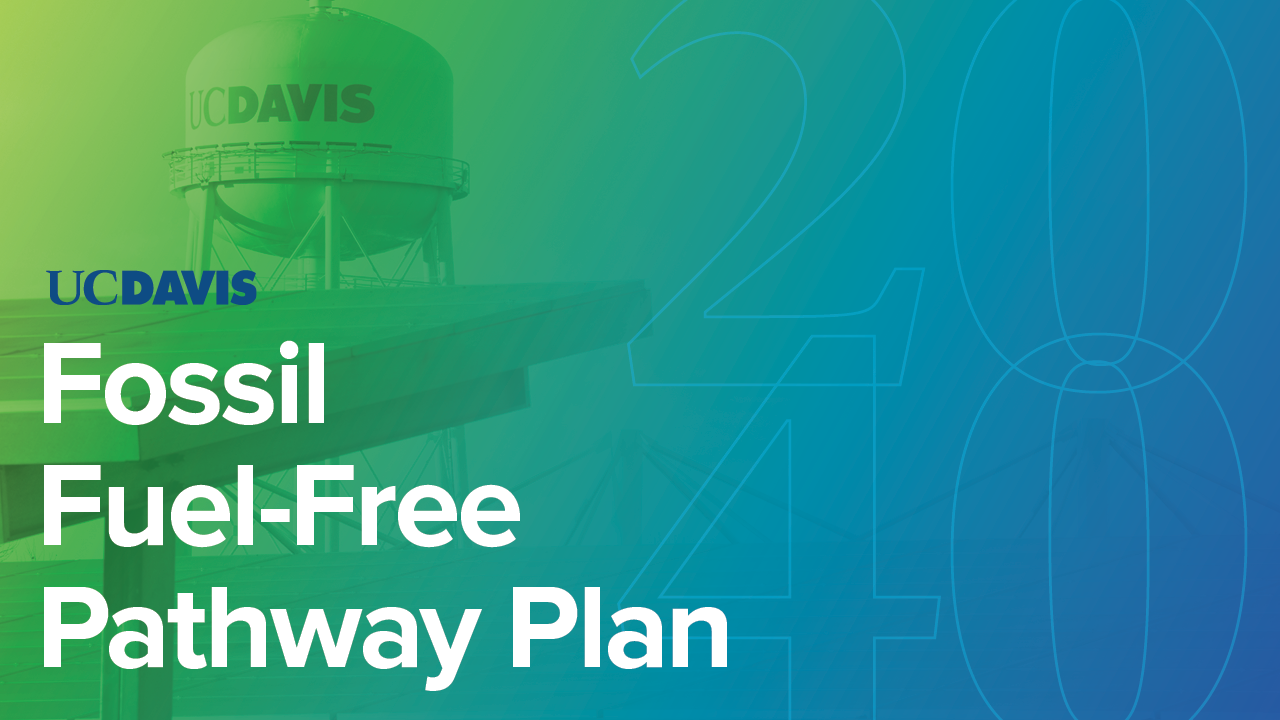
UC Davis Unveils Ambitious Fossil Fuel-Free Pathway Plan to Combat Climate Crisis
Quick Summary
- UC Davis releases its Fossil Fuel-Free Pathway Plan, a comprehensive set of strategies for how to eliminate 95% of fossil fuel use from university operations by 2040.
- The cost of accomplishing all solutions proposed in the FFFPP stands just under $1 billion in today's dollars or $58 million (excluding escalation) for the next 17 years (2024 - 2040).
- UC Davis is the first UC campus to have already broken ground on a fossil fuel-free conversion project with such tremendous decarbonization potential -- the Big Shift.
UC Davis Fossil Fuel-Free Pathway Plan
Our campus's Fossil Fuel Free Pathway Plan seeks to eliminate 80% of our 2019 baseline fossil-fuel use by 2030, and 95% by 2040.
*A one-page introduction and short plan summary are provided to facilitate reading.
In a groundbreaking move to further demonstrate its position as a sustainability leader, UC Davis released a comprehensive Fossil Fuel-Free Pathway Plan, or FFFPP, at the end of 2023. The pathway plan includes a comprehensive set of strategies for eliminating 95% of fossil fuel use from university operations by 2040 and includes the Davis campus, UC Davis Health, Aggie Square, Tahoe Environmental Research Center, Bodega Marine Laboratory, and multiple outlying and leased properties. The document stands as the earliest plan for a multi-campus UC, a UC with a medical center and one of the most extensive plans within the U.S. higher education sector.
Background
Championed by more than 75 UC Davis students, faculty, and staff to confront the climate crisis head-on, the FFFPP was set in motion by Chancellor Gary S. May's directive to the Campus Advisory Committee on Sustainability (CACS) in January 2022. The plan was finalized and posted in December 2023, after a four-month public-comment period from July through October 2023, and was made possible thanks to the rigorous efforts of multiple campus experts, authors, and a large community engagement campaign.
The FFFPP outlines ambitious targets, including the elimination of 95% of fossil fuels combusted on campus as well as purchased fossil fuels. It addresses comprehensive decarbonization plans for the university’s district heating systems, stand-alone buildings, fleet vehicles, energy infrastructure, space management, and capital planning solutions. The plan also incorporates considerations for equity, climate justice, habitat health, and responses to the over 200 comments received when the draft plan was posted for public review.
Financing the Plan
While UC Davis remains resolute in its commitment to environmental sustainability, it is crucial to acknowledge the financial constraints associated with implementing such an ambitious plan. The cost of accomplishing all solutions proposed in the FFFPP stands just under $1 billion in today's dollars, equating to an annual expenditure of approximately $58 million (excluding escalation) for the next 17 years (2024 - 2040). Once factoring in escalation, the plan will quickly total multiple billions of dollars.
"The release of the Fossil Fuel-Free Pathway Plan marks a monumental step toward our sustainable future. UC Davis is committed to addressing the urgent challenges of climate change through bold initiatives, despite the financial constraints," says Clare Shinnerl, vice chancellor of UC Davis Finance, Operations and Administration. “We hope our plan motivates other institutions of higher education to follow our lead in documenting a path forward.”
In response to these challenges, UC Davis is actively exploring various non-university funding avenues, including grants, state funding, rebates and incentives. In addition, the campus is investing in projects that generate utility savings over time and allocating state and university deferred maintenance funds to address issues that can reduce or eliminate fossil fuel use. All together these efforts underscore UC Davis' dedication to overcoming financial hurdles while advancing its commitment to a fossil fuel-free future.
Leading the Change
UC Davis has already invested $111 million in the Big Shift – a massive construction project that will allow the campus to heat its buildings with electricity instead of natural gas. However, the majority of funds required to actualize the FFFPP and complete the multiple phases of the Big Shift are yet to be identified.
“The Big Shift is a cornerstone of the FFFPP. Its completion will reduce the Davis campus’s fossil fuel consumption by 80%,” said Carla Fresquez, interim director of UC Davis Sustainability. “We can’t decarbonize without it. The two are inextricably linked.”
UC Davis is the first UC campus to have already broken ground on a fossil fuel-free central plant conversion project with such tremendous decarbonization potential. The first phase of the Big Shift was completed last winter. The next phase is slated to begin this summer.
As UC Davis navigates financial challenges, its commitment to environmental stewardship remains a priority. The Fossil Fuel-Free Pathway Plan sets the stage for a cleaner future, reaffirming the university's position as a leader in sustainability and the pursuit of a fossil fuel-free world.
Learn more
*A one-page introduction and short plan summary are provided to facilitate reading.
This article was originally published on the Sustainable UC Davis website.